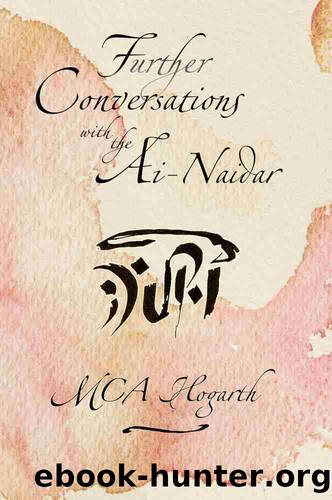Further Conversations with the Ai-Naidari by M.C.A. Hogarth

Author:M.C.A. Hogarth
Language: eng
Format: epub
Publisher: M.C.A. Hogarth
August 5, 2019 â Without Legs
âYouâre doing well,â Haraa says, paging through my notebooks. âI think you could talk with family now, and maybe it would be a little stilted but you would be understood.â
âOther than me sloshing your syllables around in my mouth like theyâre about to fall out?â
She laughs. âSince I was no better with your tongue in the beginning, I have no problems âcutting you some slack.ââ
âHow do you say that?â
âMmm. We say ni noneshu shanul chepeh. âWe add water to the pot.â A very old expression⦠youâll notice we still use the older declension ending and the original article for âtheâ.â
I squint. âSignifyingâ¦?â
âAs far as I can tell, itâs something to do with cooking. If someone over-seasons a soup in an excess of enthusiastic inexperience? You smile and water it down.â She closes my notebook. âNow, datyani. Since you can talk without offending family, you need to learn to talk without offending your betters.â
âI thought I understoodâ¦?â
âYou thought you understood,â she says. âBut your understanding was imperfect. Tell me again the ways you gradate speech.â
âWith the word order?â I say. âAnd using the different vowels in pronouns.â
She nods. âAnd didnât it make you uneasy, when you ran into sentences that didnât have pronouns, or didnât have enough words to make word order an issue? You can make entire sentences with a single verb in our language, after all.â
I sigh a little. âAll right. Go on.â
âYou will like this, I promise, da-datyani,â she says. âDo you recall significance frames?â At my squint, she makes cups of her hands. âWhen you used to draw our words, years ago, and put frames around them?â
âY-yesss,â I say, drawing the word out. âI thought at the time I was supposed to do that around every word to make it clear they were different words. But I decided I was wrong when I didnât see them often enough. Wasnât I? Wrong?â
âNo!â she says. âDid you think you were observing incorrectly? They exist! Significance framesâin writing at leastâare an antique custom, found in older texts where they were used to denote important people or elevated concepts. No one does that anymore when writing, except to call back to those texts, or in poetry. Itâs the written equivalent of writing âto thine own self be true.ââ
I pause, feeling like I am at the edge of a precipice. âAnnnd⦠youâre about to say you still do that in speech.â
She grins at me, merry. âAnd it conveys the same sense of antiquity and formality, yes.â
I stare at her a while longer, and she remains amused. I fumble through the words, but they come out anyway: âTemeqinejz daerith niki.â âYouâre having too much fun.â
âYes, yes I am,â she agrees, nonplussed. âBut, to return to the matter at hand. We have three ways of significance-framing for mannered speech. A prefix for names, a prefix for verbs, and the literal frames for sentences. The sentence frame uses that consonant youâve been thinking isnât actually part of our language, dz.
Download
This site does not store any files on its server. We only index and link to content provided by other sites. Please contact the content providers to delete copyright contents if any and email us, we'll remove relevant links or contents immediately.
Sita - Warrior of Mithila (Book 2 of the Ram Chandra Series) by Amish(54897)
The Crystal Crypt by Dick Philip K(36868)
Cat's cradle by Kurt Vonnegut(15357)
Always and Forever, Lara Jean by Jenny Han(14920)
Ready Player One by Cline Ernest(14677)
The Last by Hanna Jameson(10257)
Year One by Nora Roberts(9800)
Persepolis Rising by James S. A. Corey(9374)
The remains of the day by Kazuo Ishiguro(9000)
Never let me go by Kazuo Ishiguro(8901)
Red Rising by Pierce Brown(8786)
Dark Space: The Second Trilogy (Books 4-6) (Dark Space Trilogies Book 2) by Jasper T. Scott(8194)
The handmaid's tale by Margaret Atwood(7767)
The Circle by Dave Eggers(7115)
Frank Herbert's Dune Saga Collection: Books 1 - 6 by Frank Herbert(7090)
The Testaments by Margaret Atwood(6903)
Legacy by Ellery Kane(6659)
Pandemic (The Extinction Files Book 1) by A.G. Riddle(6541)
Six Wakes by Mur Lafferty(6259)
